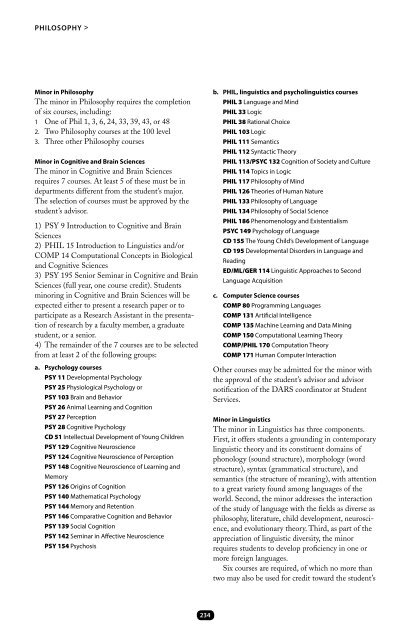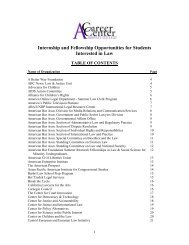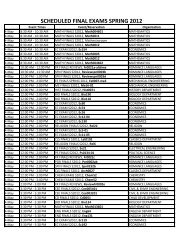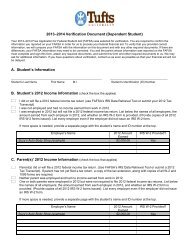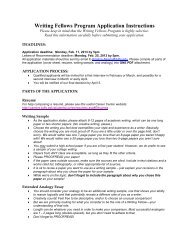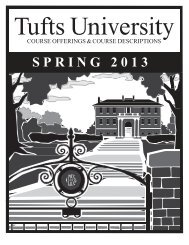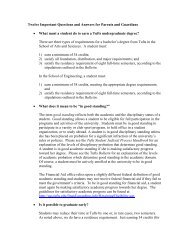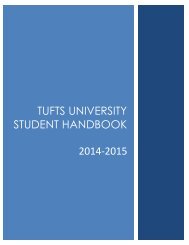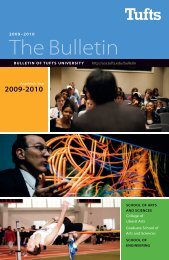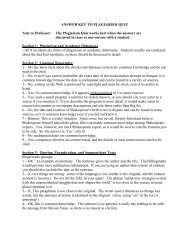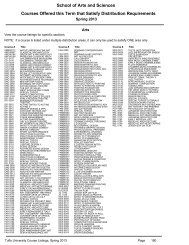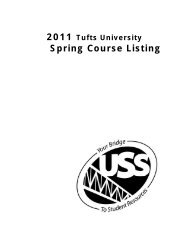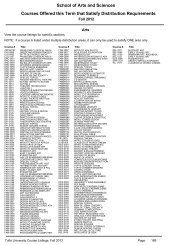2013â2014 The Bulletin - USS at Tufts - Tufts University
2013â2014 The Bulletin - USS at Tufts - Tufts University
2013â2014 The Bulletin - USS at Tufts - Tufts University
Create successful ePaper yourself
Turn your PDF publications into a flip-book with our unique Google optimized e-Paper software.
Philosophy ><br />
Minor in Philosophy<br />
<strong>The</strong> minor in Philosophy requires the completion<br />
of six courses, including:<br />
1 One of Phil 1, 3, 6, 24, 33, 39, 43, or 48<br />
2. Two Philosophy courses <strong>at</strong> the 100 level<br />
3. Three other Philosophy courses<br />
Minor in Cognitive and Brain Sciences<br />
<strong>The</strong> minor in Cognitive and Brain Sciences<br />
requires 7 courses. At least 5 of these must be in<br />
departments different from the student’s major.<br />
<strong>The</strong> selection of courses must be approved by the<br />
student’s advisor.<br />
1) PSY 9 Introduction to Cognitive and Brain<br />
Sciences<br />
2) PHIL 15 Introduction to Linguistics and/or<br />
COMP 14 Comput<strong>at</strong>ional Concepts in Biological<br />
and Cognitive Sciences<br />
3) PSY 195 Senior Seminar in Cognitive and Brain<br />
Sciences (full year, one course credit). Students<br />
minoring in Cognitive and Brain Sciences will be<br />
expected either to present a research paper or to<br />
particip<strong>at</strong>e as a Research Assistant in the present<strong>at</strong>ion<br />
of research by a faculty member, a gradu<strong>at</strong>e<br />
student, or a senior.<br />
4) <strong>The</strong> remainder of the 7 courses are to be selected<br />
from <strong>at</strong> least 2 of the following groups:<br />
a. Psychology courses<br />
PSY 11 Developmental Psychology<br />
PSY 25 Physiological Psychology or<br />
PSY 103 Brain and Behavior<br />
PSY 26 Animal Learning and Cognition<br />
PSY 27 Perception<br />
PSY 28 Cognitive Psychology<br />
CD 51 Intellectual Development of Young Children<br />
PSY 129 Cognitive Neuroscience<br />
PSY 124 Cognitive Neuroscience of Perception<br />
PSY 148 Cognitive Neuroscience of Learning and<br />
Memory<br />
PSY 126 Origins of Cognition<br />
PSY 140 M<strong>at</strong>hem<strong>at</strong>ical Psychology<br />
PSY 144 Memory and Retention<br />
PSY 146 Compar<strong>at</strong>ive Cognition and Behavior<br />
PSY 139 Social Cognition<br />
PSY 142 Seminar in Affective Neuroscience<br />
PSY 154 Psychosis<br />
b. PHIL, linguistics and psycholinguistics courses<br />
PHIL 3 Language and Mind<br />
PHIL 33 Logic<br />
PHIL 38 R<strong>at</strong>ional Choice<br />
PHIL 103 Logic<br />
PHIL 111 Semantics<br />
PHIL 112 Syntactic <strong>The</strong>ory<br />
PHIL 113/PSYC 132 Cognition of Society and Culture<br />
PHIL 114 Topics in Logic<br />
PHIL 117 Philosophy of Mind<br />
PHIL 126 <strong>The</strong>ories of Human N<strong>at</strong>ure<br />
PHIL 133 Philosophy of Language<br />
PHIL 134 Philosophy of Social Science<br />
PHIL 186 Phenomenology and Existentialism<br />
PSYC 149 Psychology of Language<br />
CD 155 <strong>The</strong> Young Child’s Development of Language<br />
CD 195 Developmental Disorders in Language and<br />
Reading<br />
ED/ML/GER 114 Linguistic Approaches to Second<br />
Language Acquisition<br />
c. Computer Science courses<br />
COMP 80 Programming Languages<br />
COMP 131 Artificial Intelligence<br />
COMP 135 Machine Learning and D<strong>at</strong>a Mining<br />
COMP 150 Comput<strong>at</strong>ional Learning <strong>The</strong>ory<br />
COMP/PHIL 170 Comput<strong>at</strong>ion <strong>The</strong>ory<br />
COMP 171 Human Computer Interaction<br />
Other courses may be admitted for the minor with<br />
the approval of the student’s advisor and advisor<br />
notific<strong>at</strong>ion of the DARS coordin<strong>at</strong>or <strong>at</strong> Student<br />
Services.<br />
Minor in Linguistics<br />
<strong>The</strong> minor in Linguistics has three components.<br />
First, it offers students a grounding in contemporary<br />
linguistic theory and its constituent domains of<br />
phonology (sound structure), morphology (word<br />
structure), syntax (gramm<strong>at</strong>ical structure), and<br />
semantics (the structure of meaning), with <strong>at</strong>tention<br />
to a gre<strong>at</strong> variety found among languages of the<br />
world. Second, the minor addresses the interaction<br />
of the study of language with the fields as diverse as<br />
philosophy, liter<strong>at</strong>ure, child development, neuroscience,<br />
and evolutionary theory. Third, as part of the<br />
appreci<strong>at</strong>ion of linguistic diversity, the minor<br />
requires students to develop proficiency in one or<br />
more foreign languages.<br />
Six courses are required, of which no more than<br />
two may also be used for credit toward the student’s<br />
234


